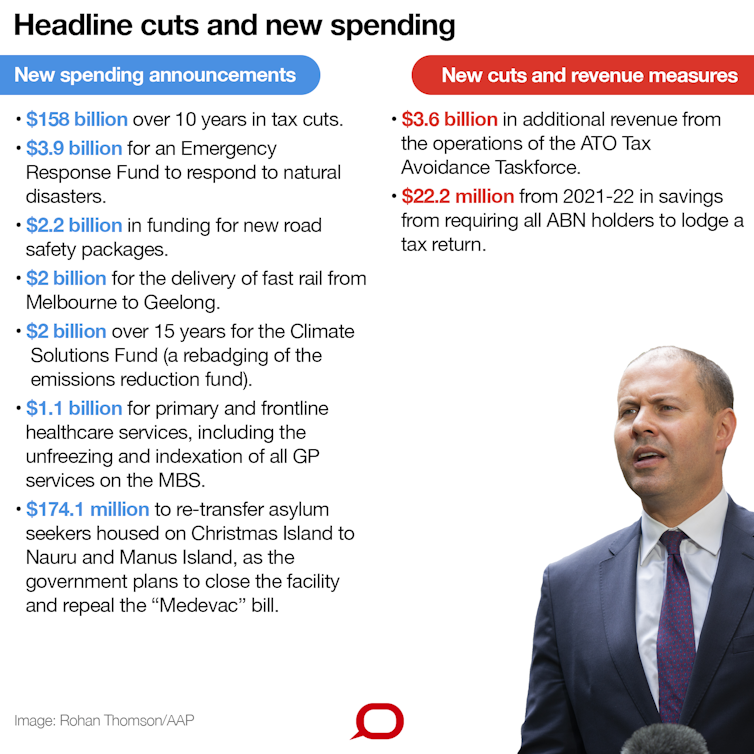budget tax-upmanship as we head towards polling day
- Written by Michelle Grattan, Professorial Fellow, University of Canberra
For the government this “election budget” is an exercise in juggling. On the one hand, it is throwing out voter bait. On the other, it is running hard on the theme of economic responsibility.
For the second budget in a row, there are highly generous tax cuts, amounting to A$158 billion over a decade. This is on top of the earlier $144 billion.
The government wants this election to be all about tax.
The tax cuts you will get, now and later. The “higher taxes” that Bill Shorten would impose – by cracking down on negative gearing and cash refunds for franking credits. And by claiming that Labor’s climate policy is a “carbon tax”.
A theme in Treasurer Josh Frydenberg’s speech was that the government was taking its initiatives “all without increasing taxes”.
Under the budget’s tax cuts, low- and middle-income earners would pocket up to $1,080 within weeks of the election – for families with a dual income, this amounts to $2,160.
Read more: Tax giveaways in Frydenberg’s 'back in the black' budget[1]
The government points out that its tax cuts are the most generous since John Howard’s time. But two things might be noted about this comparison. The 2007 tax package has since been much criticised for being irresponsible – and Howard did not win the election of that year.
Despite earlier speculation, the Coalition won’t try to rush any of the tax package – which includes a reduction in the 32.5% rate to 30% from July 2024 – through parliament this week.
The government wants to set up as much of a contrast between itself and Labor on tax as possible. Frydenberg told a news conference the tax bills were “a package” covering the immediate tax relief and the rate change. The government was asking the public “who do you trust?” to deliver lower taxes.
Finance Minister Mathias Cormann said: “We are just not prepared to haggle with the Senate in the next 24 hours.” It was up to the Australian people to back the government in, he said.
But in a game of bluff and counter-bluff on tax, Labor could simply match the immediate relief - which it did instantly.
This neutralises part of the tax argument, although the government can still highlight the contrast between its longer-term tax regime and Labor’s “higher taxing” agenda.
On economic responsibility, the budget’s boast is for a $7.1 billion surplus next financial year – the first surplus in 12 years. “The budget is back in the black and Australia is back on track,” Frydenberg told parliament, as he outlined the growth of surpluses to a total of $45 billion over four years.
Read more: Iron ore dollars repurposed to keep the economy afloat in Budget 2019[2]
We can be sure that in the election campaign Labor will match or even better the budget’s surplus figures.
Shadow treasurer Chris Bowen has learnt from the experience of the last election, when the Labor program came in with a slightly worse fiscal bottom line over the forward estimates than the government’s. The difference wasn’t huge but it was enough to be a political handicap.
The budget’s economic projections seem credible enough, although there is the perennial question over its forecast for wages growth - 2.75% in 2019-20 and 3.25% in 2020-21.
The fact that early in the imminent election campaign the departments of Treasury and Finance produce a detailed economic outlook imposes a discipline on the pre-election budget. A government that tried to fiddle the forecasts would quickly get caught out.
Read more: Frydenberg’s budget looks toward zero net debt, but should this be our aim?[3]
Frydenberg’s speech was notably sombre about the outlook for the economy, despite saying the fundamentals were sound.
“There are genuine and clear risks emerging both at home and abroad,” he warned, highlighting the cooling of the residential housing market and global trade tensions.
His words are a reminder of how quickly things can change – including the prospect of strong surpluses projected into the future. Good economic times suddenly turned bleak in the early days of the Rudd government, as a result of the global financial crisis.
The budget provided a nice reality check on the beat-up the government indulged in over the medevac bill. Remember all the hyperbole Scott Morrison sprouted, when he said he was going to have to spend more than $1 billion reopening Christmas Island?
The budget includes just $178.9 million to manage the transfer of people from Nauru and Papua New Guinea for medical treatment, $3.2 million to increase the police presence there and $3 million to reinforce the campaign to discourage people getting on boats.
The government says that if it is re-elected it will repeal the medevac bill and close the Christmas Island facility by July 1 - returning any people who have been transferred back offshore.
Questions to the office of Home Affairs Minister Peter Dutton this week about whether anybody had been transferred under the new legislation received the response that no comment was being made.
Morrison told his party room on Tuesday, before the budget, that three dates were available for the May election - May 11, 18 or 25. The general expectation is that he will announce the poll quickly. The budget might look benign, but the government does not want an extended period of Senate estimates next week which would facilitate picking it apart.

References
- ^ Tax giveaways in Frydenberg’s 'back in the black' budget (theconversation.com)
- ^ Iron ore dollars repurposed to keep the economy afloat in Budget 2019 (theconversation.com)
- ^ Frydenberg’s budget looks toward zero net debt, but should this be our aim? (theconversation.com)
Authors: Michelle Grattan, Professorial Fellow, University of Canberra




